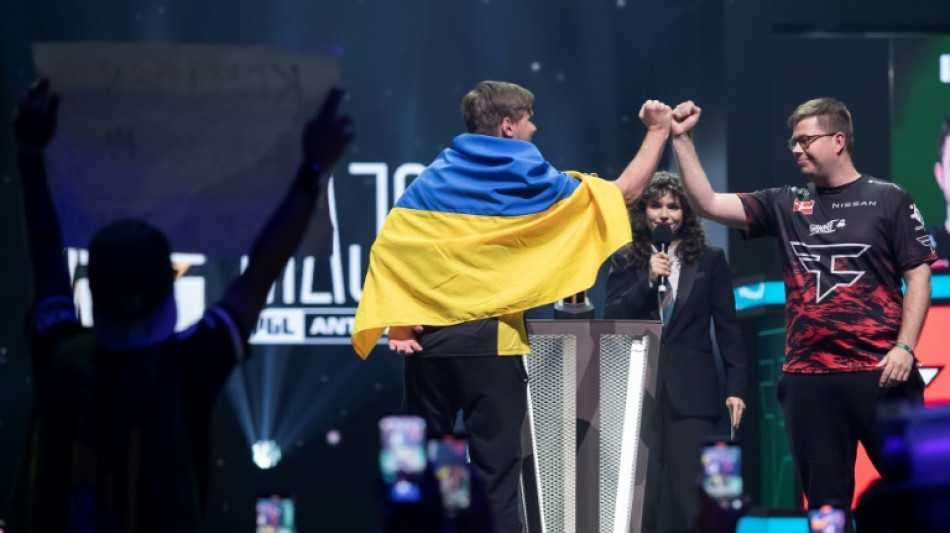
Esports a pathway back to normality for Ukrainian war veterans

Esports is helping Ukrainian war veterans, who "often feel out of place" when they return from the front line, to reintegrate into society, the head of Ukraine's Esport Commission has told AFP.
Denys Davydov, 43, speaks with authority as he also leads a commission on the development of rehabilitation programs for veterans through esports.
Hundreds of thousands of Ukrainian soldiers have been wounded since Russian President Vladimir Putin launched the invasion in February 2022. President Volodymyr Zelensky told US broadcaster NBC in February the figure was close to 380,000.
Davydov says "rehabilitation is one of the most pressing and painful issues" in Ukraine and his programme includes both able-bodied and disabled veterans.
"When soldiers return from war or end up in hospitals, they often feel out of place.
"After years spent on the front lines, they lose the part of socialisation associated with everyday civilian life.
"Sport, and especially esports, can help them reintegrate into society."
Esports was particularly effective because it "allows competition regardless of obstacles or distances".
"On one hand, we offer veterans a way to mentally unwind, and on the other, we provide a competitive outlet," he added.
Davydov, who has built up a wealth of sports administration experience primarily in rugby and football, said the second edition of the Ukrainian Veterans Esports Championship was already deep in the planning stage.
He added that esports -- because at a competitive level it requires the technology and know-how to broadcast the video games to a wider audience -- also helps develop careers in roles such as broadcast directors, tournament managers or commentators.
Perhaps most importantly for a country at war, esports can assist in helping veterans rebuild relationships closer to home.
"Veterans start to better understand their children and loved ones, they release built-up aggression, and they begin to feel like part of civilian society again," he said.
Davydov, who played badminton at a high level in Ukraine, says esports can facilitate the journey back to playing football and rugby again.
"Esports is also especially valuable for veterans who have lost mobility and are undergoing recovery," he said.
"Plus, esports improves reflexes and cognitive skills, which can eventually help them return to playing football or rugby post-rehabilitation."
- 'Visualise future worlds' -
Davydov, who from 2022 to 2024 was an advisor to the Head of the Territorial Defense of Ukraine, is proud of the fact his country has been at the forefront of the evolution of esports.
He is a flag bearer for more national teams competing, although he says the inaugural esports Olympics slated for Saudi Arabia in 2027 "exists more on paper than in practice" at the moment.
Ukraine, he said, was among the first countries to suggest forming national esports teams and Ukraine officially recognised the discipline even before the IOC did.
It has developed fast in Ukraine and one of the leading professional teams in esports globally is Navi, based in Kyiv.
That kind of success led countries including Italy, Portugal, Belgium, Georgia, Latvia, and Malta to nominate Davydov to be president of the European Esports Federation, although he did not get the role.
He is keen to dispel the notion esports is for 'couch potatoes' and that it does not encourage people to take physical exercise.
"Esports is evolving," he said. "It now has its own fitness champions, its own MMA fighters who transitioned from CS:GO (the game "Counter Strike: Global Offensive") to the ring.
"Some have become marathon runners, and so on."
Davydov says the sceptics should also be silenced by the entourage that surround the players -- they are feeding them junk food and soft drinks.
"In recent years, the esports world has realised that physically fit players perform significantly better than those who are out of shape," he said.
"Every team now has fitness trainers, mandatory physical routines, psychological support, dieticians, and proper nutrition."
As an example of the changed mindset, Davydov cites an esports textbook developed in 2022 by the National University of Physical Education and Sport of Ukraine that integrates physical training with the development of esports.
"Esports will become even more 'healthy' in the future," he says.
Davydov, though, says that away from the exercise element, esports enriches those who play them mentally.
"The skills developed through esports, particularly spatial thinking and the ability to visualise future worlds, are extremely valuable."
E.Cox--TNT